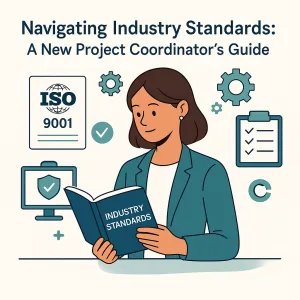Introduction to Project Management Apprenticeships
Project management apprenticeships represent a vital pathway for aspiring project managers to gain practical experience while developing essential skills in a real-world environment. These programs are designed to bridge the gap between theoretical knowledge and practical application, allowing participants to learn directly from experienced professionals in the field.
- Definition of Project Management Apprenticeships: Project management apprenticeships are structured training programs that combine on-the-job learning with formal education. They provide individuals with the opportunity to work under the guidance of seasoned project managers, gaining insights into the intricacies of managing projects effectively. This system not only equips apprentices with technical skills but also fosters the development of soft skills, such as communication and teamwork, which are crucial in project management roles [1][7].
- Importance of Hands-On Experience in Project Management: In the competitive landscape of project management, hands-on experience is invaluable. Apprenticeships allow individuals to engage in real projects, enabling them to apply theoretical concepts in practical scenarios. This experiential learning enhances their understanding of project dynamics, stakeholder management, and problem-solving techniques. Moreover, apprentices earn a salary from day one, which supports their financial independence while they learn [5][9]. The combination of earning while learning makes apprenticeships an attractive option for many aspiring professionals.
- Current Trends and Demand for Project Managers in Various Industries: The demand for skilled project managers is on the rise across multiple sectors, including technology, construction, healthcare, and finance. Organizations are increasingly recognizing the importance of effective project management in achieving strategic goals and driving innovation. As a result, there is a growing trend towards investing in apprenticeship programs to cultivate homegrown talent and address labor shortages in this field [2][3]. This trend highlights the relevance of project management apprenticeships in today’s job market, as they not only prepare individuals for immediate employment but also contribute to the long-term success of organizations by developing a skilled workforce.
Benefits of Pursuing a Project Management Apprenticeship
Embarking on a project management apprenticeship can be a transformative step for aspiring project managers and students. This hands-on experience not only equips individuals with essential skills but also opens doors to numerous opportunities in the competitive job market. Here are some key benefits of pursuing a project management apprenticeship:
- Real-World Experience and Skill Development: One of the most significant advantages of a project management apprenticeship is the opportunity to gain practical, hands-on experience. Participants engage in real projects, allowing them to develop crucial skills such as planning, budgeting, problem-solving, communication, and organization. This practical exposure is invaluable, as it prepares apprentices to tackle the challenges they will face in their future careers [3][5].
- Networking Opportunities with Industry Professionals: Apprenticeships provide a unique platform for networking with experienced professionals in the field. This interaction can lead to mentorship opportunities, insights into industry best practices, and connections that may prove beneficial throughout one’s career. Building a professional network during an apprenticeship can significantly enhance an individual’s career prospects [4][8].
- Potential for Job Offers Post-Apprenticeship: Many organizations view apprenticeships as a way to identify and cultivate talent. Successful completion of an apprenticeship can lead to job offers from the same company or within the industry, as employers often prefer to hire individuals who have already demonstrated their capabilities in a real-world setting. This pathway can streamline the transition from education to employment [2][8].
- Competitive Edge in the Job Market: In today’s job market, having relevant experience is a critical factor that employers consider. A project management apprenticeship not only provides this experience but also enhances an individual’s resume, making them more attractive to potential employers. With the demand for project-related skills at an all-time high, having an apprenticeship on one’s CV can set candidates apart from their peers [6][7].
Finding the Right Project Management Apprenticeship
Embarking on a project management apprenticeship can be a pivotal step in your career journey. It not only provides practical experience but also helps you build a professional network and develop essential skills. Here are some key points to consider when searching for and selecting an apprenticeship that aligns with your career goals:
Researching Companies and Programs
- Identify Potential Employers: Start by compiling a list of companies known for their project management practices. Look for organizations that have established apprenticeship programs, as they are more likely to provide structured training and support.
- Explore Program Details: Investigate the specifics of each apprenticeship program. This includes understanding the curriculum, the types of projects you will work on, and the qualifications of the trainers and mentors involved. Programs that offer a blend of theoretical knowledge and practical application are often the most beneficial.
Assessing the Structure of the Apprenticeship
- Duration and Commitment: Consider the length of the apprenticeship. Some programs may last a few months, while others could extend over several years. Ensure that the duration fits your personal and professional timeline.
- Training and Mentorship: Look for programs that provide comprehensive training and mentorship opportunities. A good apprenticeship should include hands-on experience, regular feedback, and guidance from experienced project managers. This support is crucial for your development and can significantly enhance your learning experience.
Considering Industry Sectors
- Aligning Interests with Opportunities: Reflect on the industry sectors that excite you. Project management skills are applicable across various fields, including construction, IT, healthcare, and finance. Targeting an apprenticeship in a sector that aligns with your interests can lead to a more fulfilling experience and better career prospects.
- Research Industry Trends: Stay informed about the current trends and demands in your chosen industry. Understanding the skills that are in high demand can help you select an apprenticeship that not only interests you but also enhances your employability.
Tips for Evaluating Company Culture and Values
- Company Research: Investigate the company’s culture and values. Look for reviews from current and former employees on platforms like Glassdoor or LinkedIn. A positive work environment that aligns with your values can significantly impact your apprenticeship experience.
- Networking: Reach out to current or past apprentices to gain insights into their experiences. They can provide valuable information about the company culture, the support provided during the apprenticeship, and the overall learning environment.
- Interview Process: Use the interview process as an opportunity to assess the company culture. Ask questions about team dynamics, management styles, and how the company supports the professional development of its apprentices.
By taking the time to thoroughly research and evaluate potential project management apprenticeships, you can find a program that not only meets your career aspirations but also provides a supportive and enriching environment for your professional growth. This careful selection process will set the foundation for a successful career in project management.
Maximizing Your Apprenticeship Experience
Embarking on a project management apprenticeship can be a transformative step for aspiring project managers and students. To ensure you make the most of this opportunity, consider the following actionable tips:
- Setting Clear Goals and Expectations at the Start: At the beginning of your apprenticeship, it is crucial to establish a clear set of goals and expectations. This not only helps you stay focused but also provides a framework for evaluating your progress. A predetermined work schedule can streamline this process, allowing both you and your supervisor to assess your reliability and development effectively [8].
- Proactively Seeking Feedback and Learning Opportunities: Continuous improvement is a hallmark of successful project managers. Regularly seek feedback from your supervisors and peers to identify areas for growth. Engaging in feedback sessions can help you refine your skills and adapt to the demands of project management [12]. Additionally, look for learning opportunities, such as workshops or training sessions, that can enhance your technical and soft skills [4].
- Building Relationships with Mentors and Peers: Establishing strong relationships with mentors and colleagues is vital for your professional development. Collaborate effectively with team members and stakeholders to foster a positive and supportive environment [10]. These connections can provide valuable insights and guidance, helping you navigate challenges and expand your network within the industry.
- Engaging in Various Projects to Diversify Skills: To become a well-rounded project manager, it is essential to engage in a variety of projects. This exposure allows you to develop a diverse skill set and gain practical experience in different aspects of project management. By working on various tasks, you can learn to break down larger goals into smaller, actionable steps, which is a critical skill in managing projects effectively [13].
By following these tips, you can maximize your apprenticeship experience and lay a solid foundation for a successful career in project management. Embrace the journey, remain open to learning, and actively seek out opportunities to grow both personally and professionally.
Overcoming Challenges During Your Apprenticeship
Embarking on a project management apprenticeship can be an exciting yet challenging journey. As aspiring project managers, it is crucial to be aware of potential obstacles and develop strategies to navigate them effectively. Here are some common challenges you may encounter during your apprenticeship, along with practical solutions to help you succeed.
Common Challenges in Project Management Apprenticeships
- Balancing Responsibilities: One of the most significant challenges is managing the dual demands of workplace responsibilities and apprenticeship studies. Many apprentices struggle to find the right balance, which can lead to stress and burnout [6].
- Scope Creep: In project management, scope creep refers to the uncontrolled changes or continuous growth in a project’s scope. This can happen when project work extends beyond the agreed-upon workload, often due to poor communication or lack of documentation [15].
- Skill Gaps: There may be a disparity between the skills required for your role and those you currently possess. This skill gap can hinder your ability to contribute effectively to projects [8].
- Personal Challenges: Apprentices may face personal issues such as unstable housing or childcare responsibilities, which can impact their focus and performance [7].
Strategies for Effective Communication and Conflict Resolution
- Open Dialogue: Foster an environment of open communication with your supervisors and team members. Regular check-ins can help clarify expectations and address any misunderstandings before they escalate into conflicts.
- Active Listening: Practice active listening to understand different perspectives. This approach can help in resolving conflicts amicably and building stronger relationships within your team.
- Feedback Mechanisms: Establish feedback loops where you can receive constructive criticism and provide input on team dynamics. This can enhance collaboration and reduce friction among team members.
Time Management Tips for Balancing Work and Learning
- Prioritize Tasks: Use tools like to-do lists or project management software to prioritize your tasks. Focus on high-impact activities that align with your apprenticeship goals.
- Set Realistic Goals: Break down your learning objectives into manageable milestones. Setting achievable goals can help you stay motivated and track your progress effectively.
- Schedule Learning Time: Allocate specific time slots for studying and completing assignments. Treat these sessions as non-negotiable appointments to ensure you dedicate enough time to your learning.
Seeking Support from Mentors and Fellow Apprentices
- Mentorship: Seek out mentors within your organization who can provide guidance and share their experiences. A mentor can offer valuable insights into navigating challenges and advancing your career.
- Peer Support: Connect with fellow apprentices to share experiences and strategies. Forming study groups or discussion forums can create a supportive network that fosters collaboration and learning.
- Utilize Resources: Take advantage of any training programs, workshops, or resources offered by your organization. These can provide additional support and enhance your skill set.
By being proactive and prepared for the challenges that may arise during your project management apprenticeship, you can maximize your experience and set a solid foundation for your future career. Embrace the journey, seek support, and remain adaptable to thrive in this dynamic field.
Transitioning from Apprenticeship to Full-Time Employment
Completing a project management apprenticeship is a significant milestone that can pave the way for a successful career in the field. As you transition from your apprenticeship to full-time employment, there are several strategic steps you can take to enhance your job prospects and secure a position that aligns with your career goals. Here are key points to consider:
Leveraging Apprenticeship Experience in Job Applications
- Highlight Transferable Skills: Your apprenticeship has likely equipped you with valuable skills such as teamwork, leadership, and problem-solving. Emphasize these transferable skills in your job applications, as they demonstrate your ability to contribute effectively in various roles, even if they are not directly related to project management [2].
- Showcase Real-World Experience: Include specific examples of projects you worked on during your apprenticeship. Detail your contributions, the challenges you faced, and the outcomes achieved. This real-world experience can set you apart from other candidates who may lack practical exposure [7].
Crafting an Impactful Resume and Cover Letter
- Tailor Your Documents: Customize your resume and cover letter for each job application. Focus on the skills and experiences that are most relevant to the position you are applying for. Use keywords from the job description to ensure your application resonates with hiring managers [1].
- Include an Apprenticeship Portfolio: Consider creating an apprenticeship portfolio that documents your growth and achievements throughout the program. This can serve as a powerful tool to showcase your development and the skills you have acquired [8].
Preparing for Interviews with Insights Gained During the Apprenticeship
- Reflect on Key Experiences: Prepare for interviews by reflecting on significant experiences from your apprenticeship. Be ready to discuss specific projects, your role in them, and what you learned. This not only demonstrates your practical knowledge but also your ability to learn and adapt [6].
- Practice Common Interview Questions: Familiarize yourself with common project management interview questions, such as those related to project implementation and team dynamics. Use your apprenticeship experiences to formulate thoughtful responses that highlight your problem-solving abilities and leadership skills [6].
Networking Strategies to Find Job Opportunities
- Utilize Professional Networks: Leverage the connections you made during your apprenticeship. Reach out to mentors, colleagues, and industry contacts to inform them of your job search. Networking can often lead to job opportunities that are not publicly advertised [5].
- Engage in Industry Events: Attend industry conferences, workshops, and networking events to meet professionals in the field. Engaging with others in the project management community can provide valuable insights and potential job leads [5].
By following these steps, you can effectively transition from your project management apprenticeship to a full-time role, positioning yourself as a strong candidate in the competitive job market. Embrace the skills and experiences gained during your apprenticeship, and use them to propel your career forward.
Conclusion
As we conclude our exploration of project management apprenticeships, it’s essential to recognize the significant role these programs play in shaping the careers of aspiring project managers. Apprenticeships offer a unique blend of practical experience and theoretical knowledge, allowing individuals to develop essential skills while earning a wage. This hands-on approach not only enhances employability but also provides a solid foundation for a successful career in project management.
Recap of the Importance of Apprenticeships in Project Management
- Real-World Experience: Apprenticeships bridge the gap between academic learning and real-world application. They allow you to work on actual projects, gaining insights that are invaluable in the field of project management [1].
- Skill Development: Through structured training and mentorship, apprentices develop critical skills such as communication, leadership, and problem-solving, which are vital for managing projects effectively [1].
- Networking Opportunities: Engaging in an apprenticeship opens doors to professional networks, providing connections with industry experts and potential employers [1].
Resources for Further Reading and Preparation
To further equip yourself for your apprenticeship journey, consider exploring the following resources:
- Guides and Blogs: Look for comprehensive guides on project management apprenticeships that provide insights into qualifications, interview techniques, and tips for success [5].
- Training Providers: Research training providers like GLP Training, which offers specialized programs such as the Level 4 Associate Project Management apprenticeship [3].
- Project Management Literature: Familiarize yourself with essential project management concepts and reports. Understanding the key reports and their uses can enhance your communication skills as a project manager [4].
By taking these steps, you can maximize your apprenticeship experience and set yourself up for a successful career in project management. Embrace this opportunity to learn, grow, and make meaningful contributions to the field.
Find out more about Shaun Stoltz https://www.shaunstoltz.com/about/.
This post was written by an AI and reviewed/edited by a human.



